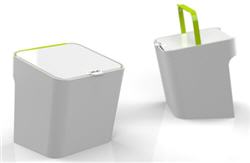Since municipalities pay for trash disposal, usually by the ton, researchers say big savings could result from reducing volume of trash, along with the cost of hauling it and paying tipping fees for disposal, in addition to improving the environment.
Today, the U.S. Environmental Protection Agency (EPA) announced approximately $3.8 million in new pilot grants to nine recipients across the country for cleanup and redevelopment of contaminated properties. One of the grants will go to the City of Mt. Shasta, Calif.
The U.S. Environmental Protection Agency will be conducting work to remove polychlorinated biphenyl (PCB) oils from old leaking electrical transformers stored at the Guam Power Authority’s Apra Heights and Talofofo Substation facilities.
A college professor and a ecotoxicologist have teamed up to write a paper suggesting that a public discourse on birth control chemicals be held before public officials decide whether to dedicate funds to cleaning such drugs from wastewater, or not.
The Environmental Protection Agency (EPA) is giving out $69.3 million grants for new investments to provide communities with funding necessary to clean and redevelop contaminated properties, boost local economies and create jobs while protecting public health.
Republic Services, a provider of recycling and waste collection, has opened a state-of-the-art regional recycling center in northwest Jacksonveille on Imeson Road. The facility will serve the residents and businesses throughout the area.
The U.S. Environmental Protection Agency (EPA) is launching a new design competition called the Campus RainWorks Challenge to encourage student teams on college and university campuses across the country to develop innovative approaches to stormwater management.
The Southeastern Pennsylvania Transportation Authority, the nation’s sixth-largest public transport organization, has signed a three-year contract with SourceOne energy consulting firm. SEPTA is looking for support for electricity and natural gas procurement.
The city of Unalaska, Alaska, will undertake a major upgrade of its municipal sewage treatment plant under a settlement of a Clean Water Act enforcement action filed against the city and the state of Alaska by the Department of Justice on behalf of the Environmental Protection Agency.
The Central Park Conservancy, an internationally recognized leader in park management and restoration, has been awarded a $500,000 grant from Alcoa Foundation and an in-kind donation of aluminum valued at $140,000 from Alcoa Recycling to design a sustainable waste management system to increase recycling and make trash removal in the Park more efficient.
Ecologix Environmental Systems, an Atlanta-based wastewater treatment company specializing in oil and gas, has enhanced their mobile Integrated Treatment System (ITS) for hydraulic fracturing.
A 100-fold upsurge in human-produced plastic garbage in the ocean is altering habitats in the marine environment, according to a new study led by a graduate student researcher at Scripps Institution of Oceanography at UC San Diego.
The United States Navy may deploy the nanotechnology-based system in its submarine fleet, according to the Pacific Northwest National Laboratory, which participated in the project.
Biological treatment plus ozone can reduce the amount of sludge coming from wastewater treatment plants by a factor of ten.
Every day, about 200 dogs and their owners visit the Cosmo dog park in Gilbert, Ariz. When they go home, they leave behind about eight cubic yards of dog waste, plastic bottles, bags and other trash.
Normally, all of that junk ends up in a landfill. But starting this month, the little gifts that Fido leaves will be used to power a light at the park, thanks to a team of engineering and technology students from ASU’s Polytechnic campus.
San Joaquin Valley landfill to spend $3.8 million to resolve Clean Air Act violations
Action Culminates 13 Year Effort, Eliminating Beach Closures, Reducing Trash and Toxic Chemicals in Waters
Achievable standard is in line with investments already being made and will inform the building of new plants moving forward.
After 25 years, former waste dump converted to endangered wildlife habitat in Guam.

Compost bins are not traditionally thought of as convenient, sleek countertop ornaments, but one California team of visionaries fashioned a new look in an effort to increase widespread adoption amongst municipalities and consumers.